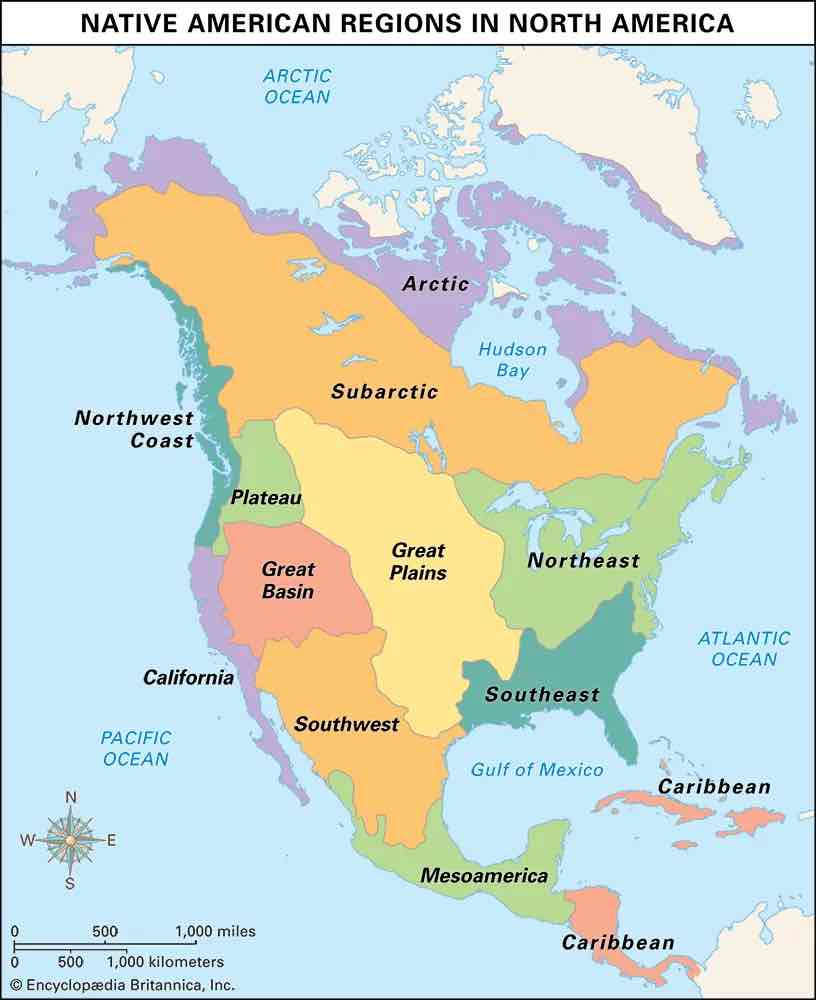1. First Americans and Early Settlements (copy)
1/30
There's no tags or description
Looks like no tags are added yet.
Name | Mastery | Learn | Test | Matching | Spaced | Call with Kai |
|---|
No analytics yet
Send a link to your students to track their progress
31 Terms
Native Americans
the original inhabitants of North America, consisting of hundreds of tribes with diverse languages, social structures, and religions.
16th century population: 7-10 million.
Native American cultural and ecological areas
Southwest, Intermediate cultural area, Northwest Coast, Arctic Coast, Subarctic, Plateau, Great Basin, Plains, Northeast, Southeast

Vikings (Eric the Red and Leif Erikson)
Vikings, Erik the Red and his son Leif Erikson, were Norse explorers from Scandinavia.
Erik the Red founded the first Norse settlement in Greenland
Leif Erikson reached present-day Newfoundland
Christopher Columbus
an Italian explorer who completed four voyages (economic, political and religious motives) across the Atlantic Ocean under the Spanish crown.
Amerigo Vespucci
a Florentine (Italian) explorer, who popularized the idea that the Americas was a new continent with his accounts and voyages.
Anasazi
an ancient Native American culture located in present-day New Mexico. They lived in ‘Pueblos’ and were known for crafts (jewelry, decorated pottery, agriculture).
Iroquois Confederacy/Federation
a powerful alliance of five Native American tribes in present-day New York (1450s).
Vasco de Balboa
a Spanish explorer who became the first European to cross the Isthmus of Panama (1513) and reach the Pacific Ocean.
Ferdinand Magellan
a Portuguese explorer employed by Spain. He discovered the Strait of Magellan near South America and named the new body of water the "Pacific".
Magellan's expedition (1519-1522) resulted in the first circumnavigation of the world.
Conquistadores (Hernán Cortés and Francisco Pizzaro)
Spanish conquerors who explored and conquered large parts of the Americas in the 16th century. Led to colonization and cultural changes in the Americas.
Hernán Cortés famously conquered the Aztec Empire (Mexico)
Francisco Pizarro conquered the Inca Empire (Peru)
Columbian Exchange
the exchange of diseases, ideas, food and populations between the New World and the Old World. Significant changes in global populations, economies, and cultures.
the ruthless treatment of indigenous peoples led to the destruction of native civilization (1540s)
African slave trade
African slavery traces back to the early exploration and settlement of the Americas.
8th century: West Africans sold slaves to Mediterranean traders
16th century: Demand for slaves rises
17th century: Dutch traders dominate market
18th century: English traders take over → slavery in English colonies
John Cabot
Italian explorer, John Cabot's expedition in 1497 marked the first documented contact with the New World, reaching Newfoundland.
Henry Hudson
English explorer, Henry Hudson’s expedition in 1609 hired by the Dutch East India Company to find the Northwest Passage (no success), he explored the Hudson River.
Sir Humphrey Gilbert
English settler, explorer who embarked on an expedition to Newfoundland in 1583. He was granted a 6-year patent by Queen Elizabeth, but he failed.
Sir Walter Raleigh
English explorer, 6-year patent from Queen Elizabeth and led three expeditions to the Americas in search of potential colony sites and resources
“Lost Colony” of Roanoke Island
unsuccessful English settlement attempt on Roanoke Island (North Carolina). Led by John White, settlers tried to continue the colony, but when White returned in 1590, they had vanished without a trace.
London Company / Virginia Company
an English joint-stock company established in 1606 by King James I. It aimed to establish colonies in North America, particularly the southern part of Virginia.
Jamestown, Virginia - first English settlement
Plymouth Company
an English joint-stock company established in 1606 by King James I of England. It aimed to establish colonies in North America, particularly the northern part of Virginia.
St. Augustine, 1565 (Florida)
1st permanent settlement in the US.
Santa Fé, 1609
city founded (present-day New Mexico) during Don Juan de Oñate’s expedition in the territory of Pueblo Indians.
Jamestown, 1607
1st permanent English settlement in the US.
Established in 1607 by the London/Virginia Company
Named after James I
lacked food, harsh winters, conflicts with native people
Quebec, 1608
1st permanent French settlement in the US by Samuel de Champlain.
New Amsterdam, 1625
was established by the Dutch, it served as the capital of New Netherlands - a Dutch colony in the US.
Puritans
a group of English Protestants in the 16th-17th c. who sought to "purify" the Church of England.
Separatists
a group of English Protestants who sought to separate from the Church of England entirely.
Jacques Cartier
French explorer, he established French fishing camps and trading posts along the St. Lawrence River.
Samuel de Champlain
French explorer, he established Quebec, which became the capital of New France.
Pequot War (1636-1637)
a conflict between the Pequot tribe and English colonists.
English → alliances the Mohegans and Narragansetts
took place in the Connecticut River Valley
tribe defeated → hundreds killed, village burned
Powhatan uprising, 1622
Powhatan Indians attacked the settlement of Jamestown, ended in a massacre of settlers due to land debate.
King Philip’s War (1675-1676)
Wampanoag tribe, led by their sachem Metacom (aka King Philip), declared war on English settlers. About 2500 settlers were killed, Metacom also died.